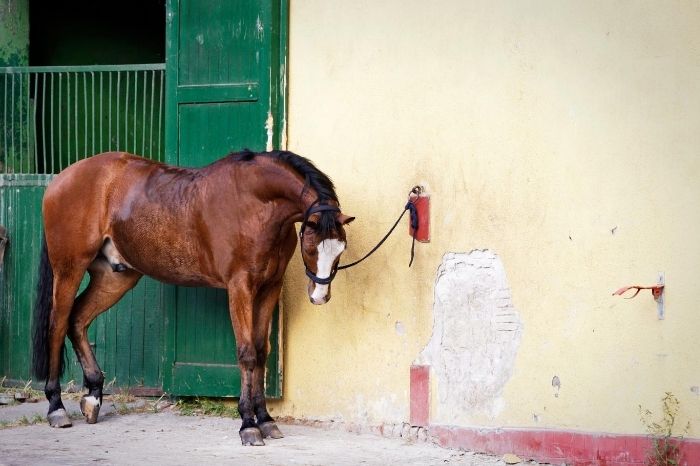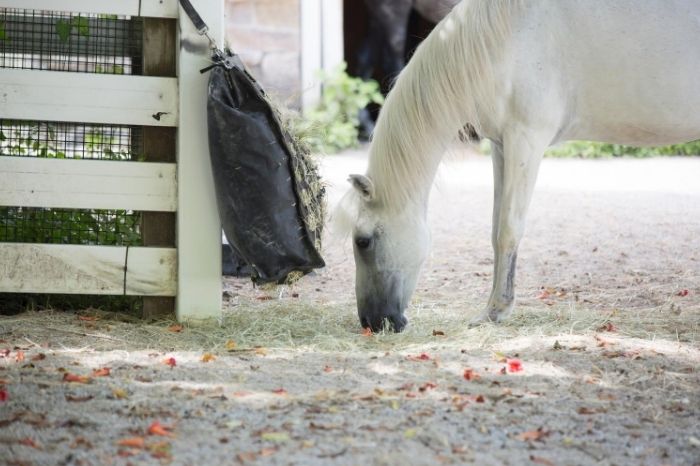Last Updated on December 28, 2021
Understanding the symptoms of ulcers in horses is important, as they can be a common occurrence that can be very uncomfortable for them. There are several things that may cause ulcers to form in horses. They can affect horses of any age or breed.
Ulcers are one of the most common ailments to occur in horses. Horses young and old, active, and inactive may experience ulcers. Some horses even experience them several times.
Symptoms of Ulcers in Horses
Ulcers are the result of erosion on the lining of the stomach which happens because of prolonged exposure of acid in the stomach. When horses exercise, the acidic fluid found in their stomach splashes and exposes the more sensitive part of their upper stomach to an acidic pH. They occur most often in racehorses, but they can affect any horses no matter what they do.
One of the most common causes of ulcers in horses is stress. Other causes include travel, limited turnout, mechanics of exercise, change in diet, limited forage, and high intake of concentrates. Long term use of certain medications may even cause ulcers to occur.
Common Symptoms of Equine Ulcers
On many occasions, the symptoms of ulcers may be subtle in horses. Some horses will display more symptoms than others. A horse that can appear completely healthy may even be suffering from gastric ulcers.
There are several symptoms in horses that may be a sign of ulcers. Some of the top symptoms include poor appetite, poor coat, change in attitude, reluctance to preform, change in performance, weight loss, and loose stool. Some horses may lay done more frequently, appear dull, and even have mild colic.
In more serious cases, the horse may colic regularly and even suffer from more severe cases of colic. Horses may even frequently grind their teeth. They may lay done even more often, even laying on their backs.
Ulcers can also commonly occur in foals. They may colic on an intermittent basis or be seen frequently laying down. They may have intermittent nursing, as the ulcers are causing discomfort.
In more severe cases, foals may display diarrhea, weak appetite, teeth grinding, and excessive salivation. In these situations, you should contact your veterinarian as soon as possible.
Prevention and Treatment
Fortunately, ulcers are treatable and there are medications you can buy to manage them. There are also several ways to prevent ulcers from happening in the first place.
When it comes to preventing ulcers, one of the top ways to prevent them is to feed horses frequently, provide slow feeders, or allow free choice, such as pasture. This will help buffer acid in the stomach and encourage salivation. Also reducing the number of concentrates will help prevent ulcers.
It is also ideal to keep your horse in a low-stress environment. When transporting, make sure your horse is as comfortable as possible. Also allow your horse to have regular turnout when possible.
Though there several ways to treat ulcers that veterinarians may prescribe, only are a few are advertised to treat ulcers. Omeprazole is currently the only FDA approved drug to treat ulcers in horses. Anti-acids may be prescribed, but they must be administered several times in order to be effective.
Help to treat your horse’s ulcers with:
No More Ulcers
Ulcers can happen to any horse. Though often subtle, there are several symptoms that can occur from ulcers. However, there are several ways to prevent them from happening and treat them.
FAQs
How does a horse act with ulcers?
There are several ways to tell if your horse has an ulcer. The first is by his behavior. Is he showing signs of intermittent colic or pain immediately after a meal? Does he become withdrawn and shy? Does he lose interest in his feed and playtime? Does he seem listless and have a reduced appetite? If your horse shows any of these signs, the best thing you can do for him is to take him to a qualified veterinarian as soon as possible. Don't wait until the problem gets worse. Ulcers can be extremely painful and, if left untreated, they can lead to other health problems.
How quickly can ulcers develop in horses?
If your horse is under a lot of stress due to an intense training program, excessive exercise, changes in his environment or feed, ulcers can develop in only one week. This is especially true if your horse has a high concentrated diet that is low in roughage. Any feed that does not contain enough roughage to promote normal gastrointestinal function can contribute to ulceration.
How much does it cost to check a horse for ulcers?
One scope only can cost up to $250 and normally two are needed (one before and one after the treatment) to determine if the treatment was effective. However, if your horse has an ulcer, the treatment will cost much more than a simple exam. You also need to be aware that untreated ulcers can lead to other health problems such as colitis, laminitis and abscesses. These can be extremely painful and expensive to treat. The longer a horse has an untreated ulcer, the more difficult and therefore more expensive it will be to treat it.
How do horses get scoped for ulcers?
The most accurate way to diagnose stomach ulcers in horses is by an endoscope, passed into the horse's stomach through his nose. The endoscope has a tiny video camera on the tip which can take high-resolution pictures of the inside of the horse’s stomach. These pictures are transmitted back to a vet who is viewing them on a large screen monitor. A vet can see any abnormalities and take biopsies if needed.
This technique is much less invasive than traditional surgery and allows for a faster recovery time. This means that horses are back on their feet and ready to work much sooner.
Can gastric ulcers cause diarrhea in horses?
Yes, they can. If a horse is suffering from stomach ulcers, his stomach can't completely break down food. Concentrated feeds are even more difficult to digest and if a horse is being fed this kind of food, the undigested starch can reach the hindgut and break the sensitive balance in bacterial population there. This may subsequently lead to diarrhea and other serious problems.
Can you feed oats to a horse with ulcers?
As mentioned before, highly concentrated feed, such as grains, will make the condition worse. If your horse was diagnosed with ulcers, it is important to feed him a diet that is low in concentrates and high in hay or alfalfa. He should be on a diet that contains about 15% protein (preferably from hay) and about 70% carbohydrates (from hay or alfalfa). Oats, barley and any sweet feeds should be avoided as they tend to aggravate an already ulcerated stomach.


